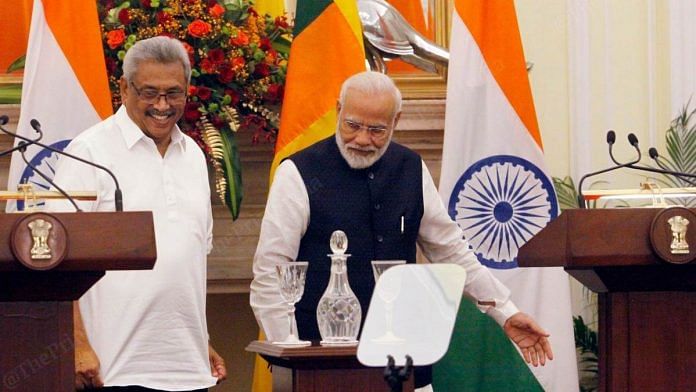New Delhi: Prime Minister Narendra Modi and Sri Lankan President Gotabaya Rajapaksa Friday attempted to reset bilateral ties between the two neighbours even as sticky issues concerning a constitutional amendment for the reconciliation of Lankan Tamils and the threat of China remain.
Rajapaksa, who was sworn in as President this month, is visiting India on his first foreign tour as the leader of Sri Lanka. His meeting with Prime Minister Modi Friday was their first bilateral interaction.
At the meeting, Prime Minister Modi announced a $400 million line of credit for supporting Sri Lanka’s economy as well as for faster progress in project cooperation.
He also announced another $50 million line of credit for security and counterterrorism as Sri Lanka seeks to equip itself against any repeat of the 2019 Easter bombings that left over 250 people dead.
These are over and above the $100 million line of credit India announced last year for the development of solar projects in Sri Lanka.
Issues pertaining to Sri Lanka’s Tamil population, which allegedly suffered grievous excesses under the regime of Gotabaya’s brother Mahinda Rajapaksa during the country’s offensive against the LTTE, also came up. Gotabaya was the country’s defence secretary when the civil war ended in 2009, and reportedly received few Tamil votes in the recent election.
‘Frank’ discussion
Addressing the media with Rajapaksa at Hyderabad House in Delhi, Prime Minister Modi said work on a housing project for Lankan Tamils — under which India is building 14,000 houses for the ethnic Tamilian population — is progressing well.
The PM also raised the controversial issue of the thirteenth amendment to the Sri Lankan constitution, which is aimed at facilitating the reconciliation of the Tamilian minority by giving them greater representation.
The matter, Modi said, was discussed in a “frank” manner between them.
“President Rajapaksa assured me of the inclusive outlook of his government. I am confident that the government of Sri Lanka will pursue the process of reconciliation to fulfil the aspirations of Tamil for equality, justice, peace and respect,” he added. “This also includes the implementation of the 13th amendment to the Sri Lankan constitution.”
The thirteenth amendment to the Sri Lankan Constitution became part of local statute as a direct result of the Indian intervention in 1987, under the India-Sri Lanka Accord. It proposed the establishment of a provincial council system and devolution of power for nine provinces in Sri Lanka.
None of the governments in Sri Lanka has implemented the amendment since Colombo sees it as an Indian imposition.
President Rajapaksa, however, carefully avoided the issue even as he urged India to do more for the development of its economy and sought New Delhi’s cooperation in counterterrorism.
“India always assisted Sri Lanka to enhance our capabilities in intelligence and counterterrorism. And we look forward to continued support in this regard,” Rajapaksa said.
He added that Sri Lanka has had to “rethink” its national security strategy since the Easter bombings this April, where coordinated suicide attacks at three churches and three luxury hotels killed over 250 people and shattered Lanka’s image as a safe haven for tourists.
“Assistance from India in this regard will be most appreciated. And Prime Minister’s assurances in this regard are most encouraging,” Rajapaksa said.
Hinting at widespread speculation that his government will be more favourable towards China, the Sri Lankan President said Colombo’s relationship with New Delhi is “multi-faceted” while being “by and large economic and commercial” with other nations.
He also vowed to keep the Indian Ocean Region a “zone of peace”.
India has been particularly concerned about growing Chinese influence in the region ever since Beijing took control of the Hambantota Port for 99 years over Lanka’s failure to pay back loans.
India, at present, is also engaged in building a container terminal at the Colombo Port in collaboration with Japan.
Alice Wells, the US Acting Assistant Secretary of State for South and Central Asia, had recently stated that Washington shares India’s concerns over Sri Lanka, which formally handed over Hambantota to China in 2017.
However, it has been reported this week that the Gotabaya Rajapaksa administration may try to secure control of the port once again.
Also read: Modi hoped Rajapaksa trip will shift focus from Maharashtra loss. But Pragya Thakur happened
Better economic ties
Rajapaksa said he and Modi also discussed how “India and Sri Lanka can work together on economically important matters”.
“As India emerges as one of the world’s growing economies, I discussed with the PM how Sri Lanka could benefit in sectors where India is strongly positioned,” he added.
However, neither India nor Sri Lanka made any mention of the India-Sri Lanka free trade agreement (FTA), which came into force in 2000. It was expected to have been upgraded to a larger Comprehensive Economic Partnership Agreement but remains unfinished business over Lankan concerns about Indian goods flooding Chinese markets.
Earlier in the day, during his ceremonial reception, President Rajapaksa told the media that he would work to bring Sri Lanka’s bilateral relationship to a “very high level”.
Both leaders also held discussions on repeated incidents of Indian fishermen being caught by the Sri Lankan authorities.
Rajapaksa has invited Prime Minister Modi to Sri Lanka as the first foreign guest of his presidency.
After Rajapaksa was sworn in last week, Modi sent External Affairs Minister S. Jaishankar to Sri Lanka as his special envoy to formally invite Rajapaksa to India.
Also read: India looks to bring ties with Sri Lanka back on track as Gotabaya Rajapaksa comes calling




Ideally, as India’s economy recovers its growth momentum, the private sector should be encouraged to invest more in countries like Sri Lanka and Bangladesh.